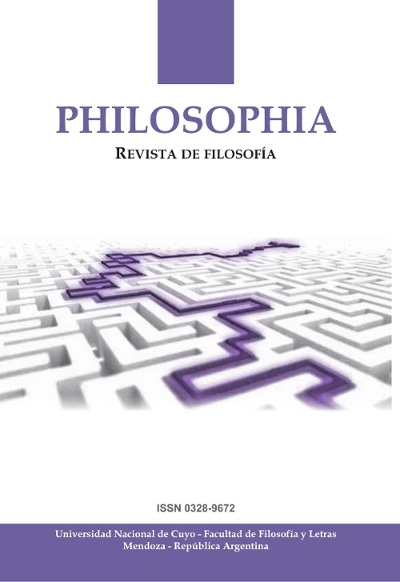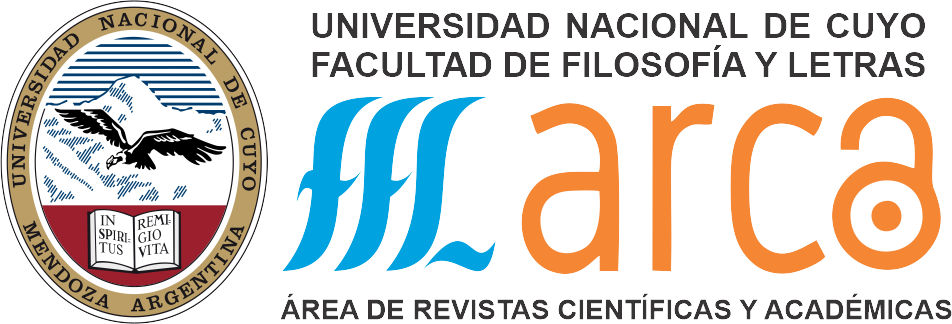The Science of First Causes in Aristotle, Metaphysics A, 1-3
Keywords:
Aristotle, Experience, Knowledge, First PhilosophyAbstract
Aristotle, at first, identifies the knowing with experience, which represents the unity of a multiplicity. But then, in its proper sense, the knowing is identified with art or science, in virtue of what it differentiates it from experience. The difference is that experience is knowledge of individuals and art or science of universals.From this difference, the conception of first philosophy as science of first causes is presented in order to better understand the crisis of experience, both in the theoretical and in the ethical-political field. The aim of this paper consists on an exposition of the aitiological (aitía) dimension of philosophy, that may respond to crisis of experience from Metaphysics A, 1-3.
References
Aristóteles, Física, Traducción y notas de J.L. Calvo Martínez (Madrid: CSIC, 1996).
Aristóteles, Metafísica. Traducción y notas de Tomás Calvo Martínez (Madrid: Gredos, 1994).
Aristotele, Metafisica, Introduzione, traduzione e note di Marcello Zanatta (Milano, BUR, 2009).
Aristotle’s Metaphysics, W.D. Ross, A revised text with Introduction and Commentary, Oxford Clarendon Press, 1924. Reprinted lithographically (Oxford: Oxford University Press, 1948, 1953 (with corrections) 1958).
Annas, J., "Aristotle on Inefficient Causes", The Philosophical Quarterly, vol. 32, nº 129 (1982): 311-326.
Arana, J., Los sótanos del universo: la determinación natural y sus mecanismo ocultos (Madrid: Biblioteca Nueva, 2012).
Aubenque, P., Le problème de l’être chez Aristote (Paris, 1962 [El problema del ser en Aristóteles (Madrid: Taurus, 1974)].
Berti, E., Aristotele. Dalla Dialettica alla filosofia prima (Milano: Bompiani, 2004).
Berti, E. y Rossitto, C., Aristotele. Il libro primo de la «Metafisica» (Roma-Bari: Laterza, 1993).
Berti, E., Struttura e significato della Metafisica di Aristotele (Roma: Edusc, 2006).
Calvo Martínez, J.L., "Introducción", en Aristóteles, Física (Madrid: CSIC, 1996).
Falcon, A. «Aristotle on Causality», en: Edward N. Zalta (ed.): The Stanford Encyclopedia of Philosophy (Fall 2011 Edition), URL = .
Follon, J., "Réflexions sur la théorie aristotélicienne des quatre causes", Revue philosophique de Louvain, 86, 1988: 317-353.
Lear, J., Aristotle: the desire to understand (Cambridge: Cambridge University Press, 1988).
Mansion, A., Introduction à la Physique Aristotélicienne (Lovain-Paris: Publications Universitaires de Louven, 1945 (I ed. 1913).
Moravcsik, J.M., "What Makes Reality Intelligible? Reflections on Aristotle’s Theory of Aitia", en: Lindsay Judson (ed.): Aristotle’s Physics: A Collection of Essays (Oxford: Oxford Clarendon Press, 1991), 31-47.
Reale, G., Il concetto di filosofia prima e l´unità della Metafisica di Aristotele (Milano, Vita e pensiero, 1961 (6ª ed. 1994).
Reale, G., Introduzione, traduzione e commentario della Metafisica di Aristotele (Milano: Bompiani, 2004).
Wieland, W.,Die aristotelische Physik (Göttingen: Vandenhoeck & Ruprecht, 1970).
Downloads
Published
How to Cite
Issue
Section
License
Se permite la reproducción de los artículos siempre y cuando se cite la fuente. This work is protected under license Attribution-NonCommercial-ShareAlike 3.0 Unported (CC BY-NC-SA 3.0) You are free to: Share "” copy and redistribute the material in any medium or format; Adapt "” remix, transform, and build upon the material
The licensor cannot revoke these freedoms as long as you follow the license terms.
Under the following terms:
Attribution "” You must give appropriate credit, provide a link to the license, and indicate if changes were made. You may do so in any reasonable manner, but not in any way that suggests the licensor endorses you or your use.
NonCommercial "” You may not use the material for commercial purposes.
ShareAlike "” If you remix, transform, or build upon the material, you must distribute your contributions under the same license as the original.
No additional restrictions "” You may not apply legal terms or technological measures that legally restrict others from doing anything the license permits.
For more information, please visit: https://creativecommons.org/licenses/by-nc-sa/3.0/deed.en






